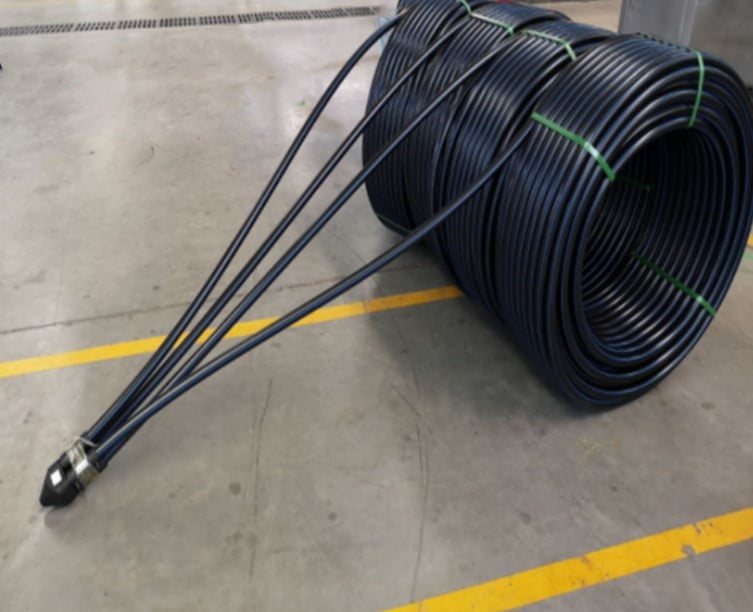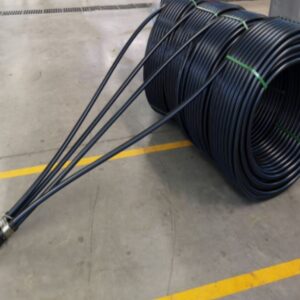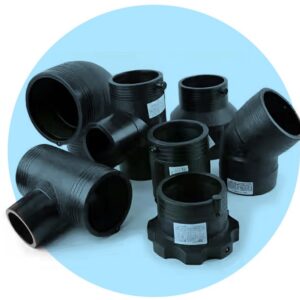HDPE ground source heat pump pipe
Ground -source heat pump system is the most energy-saving, environmentally friendly and stable energy utilization system. The special pipeline system for ground source heat pumps focuses on the supporting field of ground source heat pump systems. It is tailor-made for the characteristics of the geothermal energy exchange system. It consists of excellent quality HDPE pipes and a series of special supporting pipe fittings. It can maximize the various advantages of the ground source heat pump system.

Pipeline features
- Aging resistance and long service life: Under normal use conditions (design pressure is1.6MPa ), the ground source heat pump dedicated pipe can be used for 50 years;
- Good stress cracking resistance: Ground source heat pump special pipes have base notch sensitivity, high shear strength and excellent scratch resistance, which can resist damage caused by construction. The environmental stress cracking resistance is also very outstanding;
- Reliable connection: The dedicated pipeline systems of ground source heat pumps can be connected by hot melting or capacitance, and the strength of the joints is higher than that of the mother pipeline;
- Good chemical corrosion resistance: The ground source heat pump dedicated pipeline can resist corrosion from a variety of chemical media, and the chemical substances in the soil will not cause degradation to the pipeline. It can be applied to any geological conditions.
- Good wear resistance: The special pipes for ground source heat pumps have high wear resistance, and the wear resistance is5 times that of steel pipes.
- Good flexibility: The special pipe for ground source heat pump has the flexibility to bend easily, which makes the construction convenient, reduces the labor intensity of installation, can reduce the use of pipe fittings, and reduce the installation cost;
- Small water flow resistance: The special pipeline for ground source heat pump has a smooth inner surface. The smooth performance and non-adhesive characteristics ensure that the pipeline has a higher transportation capacity than other pipes, while also reducing the pressure loss of the pipeline and the energy consumption of water transmission and distribution;
- Thermal conductivity: The material of the ground source heat pump special pipe has good thermal conductivity, which is very conducive to heat exchange with the earth. It not only reduces the material cost, but also reduces the installation cost. It is most suitable for the ground source heat pump system;
- Complete supporting facilities: The ground source heat pump dedicated pipeline system is fully equipped to meet the needs of different projects.
Pipeline advantages
- Energy saving and high efficiency
The ground source heat pump system is a new air conditioning technology that uses geothermal energy, a renewable energy source advocated and promoted internationally, as a cold and hot source to heat and cool buildings and provide domestic hot water. It is 2-3 meters below the ground and maintains a constant temperature ( 10-15 ℃ ) all year round, which is much higher than the outdoor temperature in winter. Therefore, the ground source heat pump uses the heat pump to increase the low-level heat energy in the earth to heat the building in winter; in summer, the heat pump transfers the heat in the building to the ground to cool the building. The energy efficiency ratio of the boiler system (energy efficiency ratio = output energy / input energy) is only about 0.9 , the energy efficiency ratio of ordinary central air conditioning is about 2.5 , and the energy efficiency ratio of the energy heat pump system can reach more than 4.0 . The energy utilization efficiency is doubled.
- Green, environmentally friendly and pollution-free
When the ground source heat pump system is used for heating in winter, it does not require a boiler and does not emit combustion products, which can significantly reduce the emission of room temperature gases, thus protecting the environment and complying with the Global Climate Convention. When cooling in summer, the heat is also transferred to the ground, and no hot river gases are emitted into the atmosphere. If it is widely used, it will greatly reduce the room temperature effect and slow down the process of global warming.
- Renewable energy, never exhausted
The ground source heat pump system removes heat from or discharges heat to the shallow normal temperature soil. The heat energy of the shallow soil comes from solar energy, which is never exhausted and is a renewable energy source. Therefore, when using the ground source heat pump system, the soil heat source can be replenished by itself. Continuous use is not inferior to the problem of resource depletion. In addition, the soil has good heat storage performance. In winter, the heat pump can cool down the low-level thermal energy buildings in the earth, and store heat for winter use, ensuring the balance of the earth’s heat.
- Stable operating conditions
The ground temperature is stable all year round and is not affected by the atmospheric environment, allowing the heat pump to operate efficiently whether in heating or cooling.
- Lowoperating costs
The heating and cooling costs of a ground source heat pump system are only 30-70% of the costs of ordinary heating and cooling technologies .
- Low maintenance fee
The ground source heat pump system does not have outdoor installed equipment, no cooling tower, roof fan, and no outdoor equipment installation and maintenance costs.
- Longer service life
The service life of the units is more than 20 years, and the service life of the underground pipe heat exchange system and closed surface water heat exchange system can reach 50 years.
- Save space
It eliminates the need for cooling towers and boiler rooms and the supporting coal yards and slag yards, saves land resources, generates additional economic benefits, and improves the external environment of the building.
- Safe and reliable
There is no combustion equipment, so there is no hidden danger of explosion or combustion.
energy technology
The ground source heat pump system is a cooling and heating air conditioning and domestic hot water system that uses rock, groundwater or the ground as the main low-temperature heat source , and is composed of a water source heat pump unit, a geothermal energy exchange system, and a system within a building. According to the different forms of the geothermal heat exchange system, the ground source heat pump system is divided into a buried pipe ground source heat pump system, a groundwater ground source heat pump system, and a surface water ground source heat pump system.
Underground pipe heat exchange system
A low-energy exchange system in which the heat transfer medium exchanges heat with the rock and soil through vertical or horizontal buried tube heat exchangers, also known as soil heat exchange system.
- Horizontal ground heat exchange system (horizontal ground heat system )
- Verticalground heat system
Groundwater heat exchange system
A geothermal energy exchange system in which groundwater is pumped out and returned to the same underground aquifer after heat exchange .
Surface water heat exchange system
Geothermal energy exchange systems that exchange heat with surface water are divided into open surface water heat exchange systems and closed surface water heat exchange systems.
- Opensurface water heat exchange system
( open-loop surface water system )
- Closed surface water heat exchange system
( closed-loop surface water system )






Reviews
There are no reviews yet.